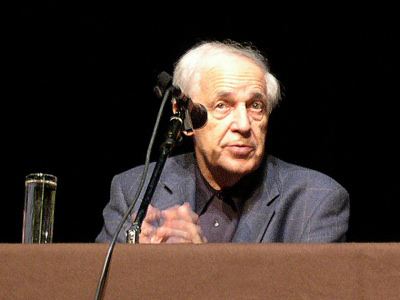 |
 |
 |
 |
  image
from Wikimedia image
from Wikimedia
In
a time where the intellectual laziness of composers, favoring
"minimalism" and "structuralism", because these do not need to be
crafted with a logical and structural approach, Boulez shows us what
makes for a great musical composition
What makes a musical composition stand "alive", for centuries and
probably forever? There were many answers to that question, none fully
satisfying. What makes us delight in a Fugue by J.S.Bach three
centuries later? I do not think there can be any definitive answer. But
one can attempt for some and the research can be interesting. I believe
that first of all, like a specie to remain alive, a musical composition
must have a strong inner structure. This is probably not the only true
answer, if any, but at least one explanation. This strong inner structure is what makes
an organism survive and it may well apply for a work of art.
Click here
to connect with me for discussing that on my personal Facebook space,
or here
to
visit my Fan page...
|
 |
 |
 |
 |
 |
 |
 |
 |
|
 |
|
 |
|
 |
 |
 |
 |
Some interesting search results:
Pierre Boulez: A Resource Guide
http://artsci.case.edu/bakernord/data/media/programs_and_events/Pierre%20Boulez_A%20Resource%20Guide.pdf
Pierre Boulez is one of the most important musical and intellectual
figures of the twentieth century. As a composer, he wrote a new chapter
in the history of music in the fifties, particularly with Le Marteau
sans Maître (1953-55), a synthesis of many different streams in modern
and world music (including Balinese, African, and Japanese).
http://www.bach-cantatas.com/Bio/Boulez-Pierre.htm
Pierre Boulez is also an
articulate, perceptive and sweeping writer on music. Others
dealt with questions of technique and aesthetics in a deeply reflectif
sometimes elliptical manner. These writings have mostly been
republished under the titles Stocktakings from an Apprenticeship
, Orientations: Collected Writings , and Boulez on Music
Today , as well as in the journal of the Darmstadt composers of the
time, Die Reihe . A third edition of the French texts, with
previously uncollected material, has appeared under the title
Points de repère I, II, and III .
Pierre Boulez is also a conductor, known the world over having directed
most of the world's leading symphony orchestras and ensembles since the
late fifties. He served concurrently as musical advisor of the
Cleveland Orchestra from 1970 to 1972, chief conductor of the BBC
Symphony Orchestra from 1971 to 1975, and music director of the New
York Philharmonic from 1971 to 1977. He is currently the Conductor
Emeritus of the Chicago Symphony Orchestra, after having been its
Principal Guest Conductor. The orchestras which he has conducted in
recent years include the Berlin and Vienna Philharmonics, the London
Symphony Orchestra (2004 tour), the Orchestre de Paris, the Ensemble
InterContemporain, the Mahler Chamber Orchestra . In 2005 he
began a collaboration with the Staatskapelle Berlin .
Pierre Boulez: "...explosante-fixe..." - Piece Detail |
LA Phil
http://www.laphil.com/philpedia/piece-detail.cfm?id=2431
Pierre Boulez is a ceaseless questioner. His refusal to stop and settle
down with a given solution complements a restless perfectionism. This
creative doubt might also seem, on the surface, to contradict the
supreme confidence Boulez brings to his roles as both composer and
conductor. Yet such dichotomies are integral to Boulez’s musical
thinking, generating the tension that has made him such a powerful
leading force of the postwar avant-garde.
Articles about Pierre Boulez - Los Angeles Times
http://articles.latimes.com/keyword/pierre-boulez
Much as conductor-composer Pierre Boulez is a towering figure in music
and a celebrity in his own domain, he is one with seemingly little
interest in the star-making machinery that exists in classical music.
At the Japan America Theater last week, in one of his four concert
programs during a recent monthlong stay with the Los Angeles
Philharmonic, the audience offered a wildly enthusiastic ovation upon
Boulez's arrival. The stoic Frenchman was taken aback.
South Florida Classical Review
http://southfloridaclassicalreview.com/2011/02/new-world-center-proves-ideal-chamber-venue-in-superbly-varied-program/
Because of its difficulty and the frequently adverse reaction of
audiences, the music of Pierre Boulez is not a frequent visitor to the
general concert platform (especially in Florida). Sunday's program by
musicians of the New World Symphony brought a belated visit of the
music by this noted conductor, and showed us just what we have been
missing.
Pierre Boulez: A Resource Guide
http://artsci.case.edu/bakernord/data/media/programs_and_events/Pierre%20Boulez_A%20Resource%20Guide.pdf
As a conductor, he gave contemporary music its rightful status and
renovated many masterpieces of symphony and opera (Wagner, Bruckner,
Mahler, Debussy, Stravinsky, Bartók and others). He made his début at
the renowned Bayreuth Festival with Parsifal in 1966, returning to
conduct Wagner's final work again in 1967, 1968, and 1970. His
recordings have earned him a total of 26 Grammys and vast numbers of
other prestigious awards.
|
|
 |
 |
 |
 |
 |
 |
 |
|